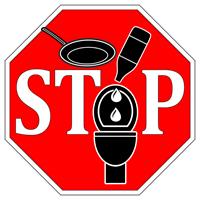PDF chapter test TRY NOW
Housekeeping Practices
An excellent way to minimise the waste and pollutants at their source is to check what is going in our drains.
We will be able to reduce the swage only if we dispose of our waste properly.
The following are some of the housekeeping practices that we should adopt:
- The oils and fats which are used for cooking should not be thrown in the drains. Instead, they should be thrown in the dustbin because if we through them in the open drain, the fats clog the soil pores reducing its effectiveness in filtering the water. Moreover, it is difficult to separate them from the water.
- As the chemical substances such as insecticides, paints, solvents, motor oil, medicines can kill the microbes in the water that help in its purification they should not be thrown in the drains.
- Solid substances such as used tea leaves, solid food remains, cotton, sanitary towels, soft toys should always be thrown in the dust bin as these wastes choke the drains and do not allow the free flow of oxygen. This leads to the hampering of the degradation process.


The government of India has initiated a new mission known as the Swachh Bharat in the year 2016. Under this mission, a lot of drives such as proper sewage disposal and providing toilets for everyone was started.
Vermi-processing toilet
In India, a toilet design in which the human excreta is treated with earthworms was being tested. This is known as vermi-processing toilet. During the testing, it was found that it is novel as it is a low water-use toilet for the safe processing of human wastes. The functioning of the bathroom was also found to be very simple and hygenic. In this process, the human excreta is converted to vermi cakes which is a resource that is much needed for the soil.
